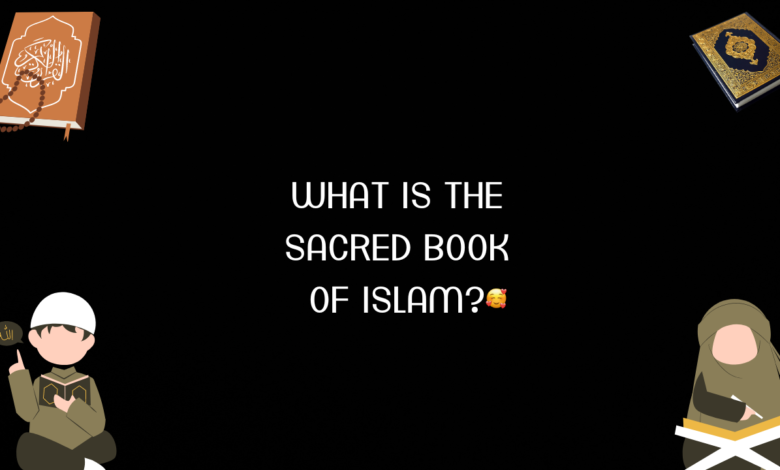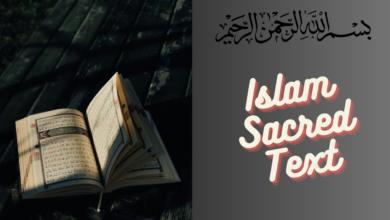What is the Sacred book of Islam?

Introduction
The Islamic faith, one of the world’s major religions, is deeply rooted in its holy scripture, the Quran. Also spelled as Qur’an, this sacred book holds unparalleled significance for Muslims worldwide. It serves as a guide, a source of inspiration, and a direct connection to the divine teachings of Allah. In this article, we delve into the essence of the Quran, exploring its origins, structure, and importance in shaping the beliefs and practices of Muslims.
Origin and Revelation
The Quran is believed by Muslims to be the literal word of God (Allah) as revealed to the Prophet Muhammad through the angel Gabriel (Jibril) over a period of approximately 23 years. The revelations began in 610 CE when Muhammad was meditating in the cave of Hira, near Mecca. The angel Gabriel appeared to Muhammad and instructed him to “Read,” initiating his role as a prophet and messenger of God.
Over the subsequent two decades, these revelations were conveyed to Muhammad in the Arabic language, covering a wide array of topics ranging from theology and morality to social justice and guidance for personal conduct. Muhammad, who was illiterate, memorized and recited the revelations, and his followers, known as companions, also committed them to memory or wrote them down.
Compilation and Structure
After the death of Muhammad in 632 CE, the task of compiling the scattered revelations into a single written text fell to his companions. Under the caliphate of Uthman ibn Affan, the third caliph, a standardized version was compiled, and multiple copies were distributed throughout the growing Islamic empire. This compilation sought to preserve the purity of the revelations and ensure consistency in the text.
The Quran is divided into 114 chapters, known as “Surahs,” which vary in length and cover diverse subjects. Each Surah is further divided into verses, called “Ayahs.” In total, there are over 6,000 verses in the Quran. The chapters are not arranged chronologically; instead, they are generally ordered by length, with the longest ones coming first and the shortest ones towards the end.
Spiritual and Practical Significance
For Muslims, the Quran holds paramount importance in their faith and daily lives. It is considered a comprehensive guide for all aspects of life, providing spiritual enlightenment and practical guidance. Muslims believe that by following the teachings outlined in the Quran, they can live in accordance with Allah’s will and attain both spiritual fulfillment and success in this world and the Hereafter.
The Quran emphasizes monotheism (Tawhid), ethical conduct, social justice, compassion, and the importance of seeking knowledge. It addresses a wide range of topics, including the rights and responsibilities of individuals, family life, charity, economic ethics, and the treatment of the less fortunate. The book also provides insight into the stories of earlier prophets, imparting valuable lessons and moral guidance.
Recitation and Memorization
The Quran is recited and memorized by Muslims as an act of worship and devotion. The rhythmic and melodious recitation of its verses holds spiritual significance, and the act of memorizing the entire Quran is considered a great achievement. Those who have committed the entire Quran to memory are given the honorary title of “Hafiz” or “Hafiza.”
Many Muslims recite the Quran during their daily prayers (Salat) and seek to understand its meanings through contemplation and study. Interpretations and explanations of the Quranic text, known as “Tafsir,” have been developed by scholars throughout history to help believers better understand its depth and context.
Conclusion
The Quran stands as the heart and soul of Islam, offering divine guidance to millions of believers around the world. Its timeless teachings continue to shape the beliefs, practices, and moral compass of Muslims across diverse cultures and backgrounds. As a source of enlightenment, solace, and inspiration, the Quran’s influence extends beyond religion, impacting various facets of individual and communal life.
Frequently Asked Questions (FAQs) about the Sacred Book of Islam (Quran)
What is the Sacred Book of Islam?
The Sacred Book of Islam is called the Quran (sometimes spelled as Qur’an or Koran). It is considered the holy scripture of Islam and is believed by Muslims to be the literal word of God as revealed to the Prophet Muhammad through the Angel Gabriel.
What is the significance of the Quran in Islam?
The Quran holds immense importance in Islam as it serves as the primary source of guidance for Muslims in matters of faith, morality, law, and daily life. It outlines the principles and teachings that Muslims should follow to live a righteous and fulfilling life.
How is the Quran structured?
The Quran is divided into 114 chapters called “Surahs,” which vary in length. These chapters are further divided into verses known as “Ayahs.” The total number of verses in the Quran is over 6,000.
What language was the Quran revealed in?
The Quran was originally revealed in classical Arabic. It is considered a masterpiece of Arabic literature and is highly revered for its linguistic beauty and depth of meaning.
How was the Quran revealed?
Muslims believe that the Quran was revealed to the Prophet Muhammad over a period of approximately 23 years, starting in 610 CE and concluding in 632 CE. The revelations occurred through Angel Gabriel, who conveyed the words of God to Muhammad.
Is the Quran available in translation?
Yes, the Quran has been translated into numerous languages to make it accessible to people around the world. However, it’s important to note that translations may not fully capture the linguistic richness and nuances of the original Arabic text.






